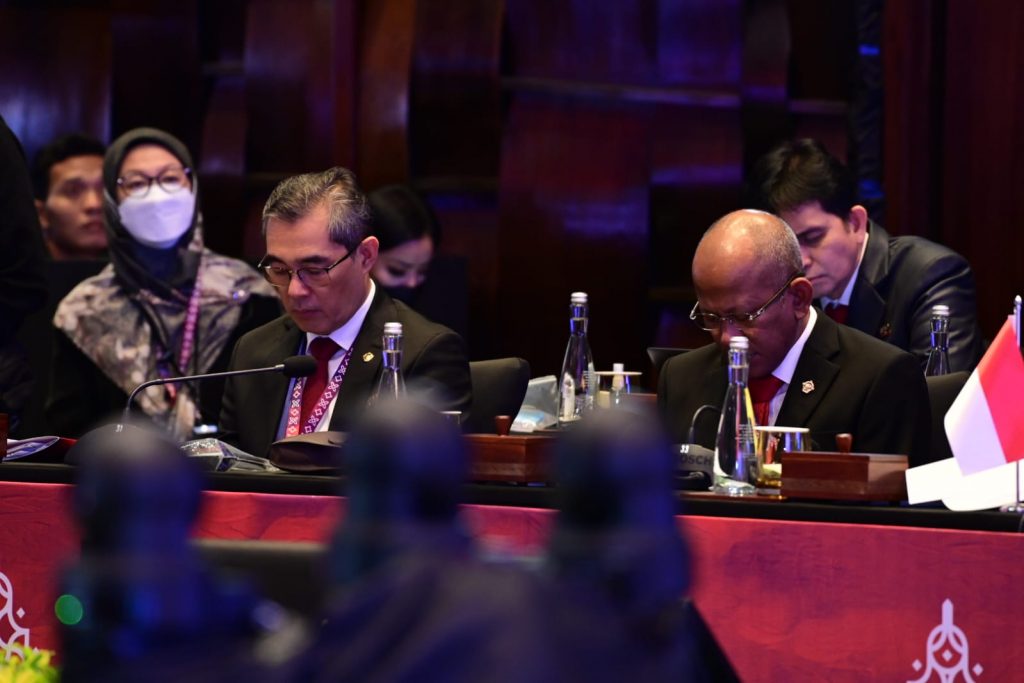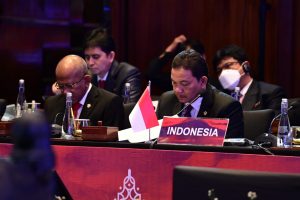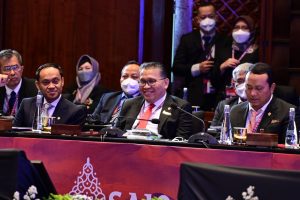JAKARTA, WARTA PEMERIKSA — Badan Pemeriksa Keuangan (BPK) sukses menyelenggarakan Supreme Audit Institutions 20 (SAI20) Summit yang dihelat di Nusa Dua, Bali, pada 29-30 Agustus 2022. Konferensi tingkat tinggi (KTT) lembaga pemeriksa negara G20 tersebut menyepakati 12 poin komunike. KTT SAI20 juga menyepakati rules of procedure (RoP) atau aturan internal.
“Hasil KTT SAI20 berupa komunike akan kami sampaikan kepada Presidensi G20 Indonesia untuk menjadi bagian dari hasil bersama para pemimpin negara G20 pada KTT G20 bulan November 2022.”
Ketua BPK Isma Yatun dalam pernyataan bersama para delegasi SAI pada Selasa (30/8/2022) menyampaikan, pertemuan KTT SAI20 merupakan puncak dari rangkaian kegiatan pertemuan sebelumnya. BPK sebelumnya sudah menggelar pertemuan bilateral, pertemuan teknis (technical meeting), dan pertemuan pejabat senior (senior officials meeting) untuk menyiapkan dokumen yang akan disepakati di KTT SAI20 ini.
“Kami menyepakati dua hal penting dalam KTT SAI20 ini, yaitu komunike SAI20 dan aturan internal SAI20 atau rules of procedures (RoP). Komunike SAI20 merupakan pernyataan bersama kami sebagai kontribusi SAI20 kepada G20 untuk mendukung tema Presidensi G20 Indonesia, yakni ‘Recover Together, Recover Stronger’,” kata Ketua BPK. Adapun RoP yang disahkan merupakan aturan tata kelola untuk kegiatan-kegiatan SAI20 pada masa mendatang.



Ketua BPK menjelaskan, pada KTT Tahun 2022, SAI20 membahas dan menyampaikan pernyataan terkait percepatan pemulihan ekonomi dan dukungan terhadap pencapaian Sustainable Development Goals (SDGs) atau Tujuan Pembangunan Berkelanjutan. Khususnya terkait arsitektur kesehatan global, transisi energi, dan transformasi digital.
Dalam Komunike SAI20 Tahun 2022, SAI20 juga menyepakati keberlanjutan kepemimpinan SAI20 berikutnya yang mengikuti Presidensi G20, yaitu oleh Badan Pemeriksa India pada tahun 2023 dan Badan Pemeriksa Brasil pada tahun 2024.
“Hasil KTT SAI20 berupa komunike akan kami sampaikan kepada Presidensi G20 Indonesia untuk menjadi bagian dari hasil bersama para pemimpin negara G20 pada KTT G20 bulan November 2022,” kata Ketua BPK.
SAI2 merupakan engagement group G20 yang diinisiasi oleh BPK. Sejak G20 dibentuk pertama kali pada 1999, SAI20 baru dibentuk dan diresmikan pada Presidensi G20 Indonesia tahun 2022.
SAI20 COMMUNIQUE
1. We, the Heads of Supreme Audit Institutions (SAIs) of the Group of 20 (G20) from Argentina, Australia, Brazil, China, India, Indonesia, Korea, Mexico, Russia, Saudi Arabia, South Africa, and Türkiye attended the inaugural SAI20 Summit in Bali, Indonesia on 29-30 August 2022. We agreed jointly in accordance with the adopted Rules of Procedure for the SAI20 engagement group to promote collaboration, including through sharing knowledge and best practices among SAIs in G20 countries and with other relevant stakeholders in order to contribute to strengthening oversight, developing insight, and providing strategic foresight to foster accountable governance.
2. In doing so, we also recognized and acknowledged the different mandates of each respective SAI of member countries, the need to ensure the unity and integrity of the SAI community under the International Organization of Supreme Audit Institutions (INTOSAI) platforms and initiatives, as well as the need to develop a platform for strengthening the SAIs’ role as a strategic partner of G20 governments in responding to global challenges.
3. We emphasized the three priority issues of Indonesia’s G20 presidency, namely: Global Health Architecture, Sustainable Energy Transition, and Digital Transformation in respect of which G20 governments will continue to take the lead among others to assist in ensuring equitable access to COVID-19 vaccines as well as promoting sustainable and inclusive economic development.
4. We recognized that the COVID-19 pandemic has not only increased the risks of fraud due to the rapid implementation of government response programs but also widened inequality across the globe due to unachieved development targets, thus hindering the achievement efforts of Sustainable Development Goals (SDGs) globally.
5. We stressed that outside of the direct impacts of the pandemic, global recovery is also at risk from more persistent supply disruptions, mounting inflationary pressures, financial stresses, an emerging energy crisis, the potential for climate-related disasters, increased global instability, and weaker-than- anticipated long-term growth drivers.
6. We acknowledged that SAIs need to focus on the government’s response to accelerate economic recovery and resume intensifying efforts to achieve the 2030 agenda. In addition, SAIs and other stakeholders are encouraged to create a suitable environment for a well-managed public sector and business sustainability, to assist developing nations’ resilience, to better respond to various future challenges and uncertainties with a view to achieving stronger, greener and healthier global development.
7. Referring to United Nations General Assembly Resolution A/66/2091 and INTOSAI Principles 122, we noted that public sector auditing has an essential role in promoting the efficiency, accountability, effectiveness, and transparency of public administration while supporting the global response to the COVID-19 crisis and SDGs implementation.
8. In this context, we as SAIs, in demonstrating our relevance to citizens, governments, parliaments, and other stakeholders, are committed to providing independent and objective insight, also timely and relevant information to ensure the accountability, transparency, and integrity of the government. We are also committed, while the response to the pandemic from the SAI of each of the G20 countries may differ, to help governments identify potential risks, impacts, and possible responses to be implemented in order to deliver good public policy outcomes and promote good governance, as well as contributing to the follow-up and review of SDGs implementation.
9. In line with the priorities of the current G20 presidency and SAI20 with an emphasis on the sustainability and inclusiveness of economic recovery that benefits all and leaves no one behind, we call on the governments of G20 to:
● Address the importance of policy coherence, coordinated planning, good governance, and sound risk management in managing an emergency, including the importance of crisis prevention, preparedness, and coordination across key governance structures.
● Improve efficiency, accountability, effectiveness, and transparency frameworks for better implementation of policies and programs, including the development of clear performance targets, assessment criteria, and robust monitoring and reporting.
● Ensure healthcare systems provide efficient, available, agile, and equally accessible healthcare for all citizens.
● Ensure that the rapid pace of digitalization leaves no one behind and that the digital transformation enables sustainable economic growth.
● Continue to foster the sustainable energy transitions that enable clean, affordable, and economically viable energy production.
● Ensure the agility of health systems in an ever-changing environment, and equity while prioritizing the availability, distribution, and deployment of resources and health facilities.
● Ensure the comprehensive mapping and coherence of government programs and policies for achieving sustainable development, including the SDGs.
10. We noted the importance of multi-stakeholder engagement in responding to related global issues. Thus, we call on the governments of G20 to collaborate with all related stakeholders to:
● Highlight the importance of documentation, as well as increase intelligence and data analytics capabilities to support the monitoring of policies, programs, and service delivery.
● Leverage digital transformation while identifying and mitigating the risks to data security and safety, cyber security and resilience, as well as data protection and privacy.
● Consider the need for a framework for sustainability reporting, such as Environmental, Social, and Governance (ESG), for the public sector to provide transparency and accountability of government programs toward a greener economy, especially in the energy transition process and more inclusive economic growth.
11. In the face of uncertainty, complexity, rapid changes, and emerging challenges we stressed the importance of the role of SAIs as external independent institutions to pursue a comprehensive initiative and play an active role in promoting the efficiency, accountability, effectiveness, and transparency of public administration.
12. We thank the Audit Board of the Republic of Indonesia for initiating the establishment of SAI20 and convening its first Summit under Indonesia’s G20 presidency. We look forward to supporting the Comptroller and Auditor General of India, and the President of the Federal Court of Accounts – Brazil as the chair of SAI20 in 2023 and 2024 respectively.



